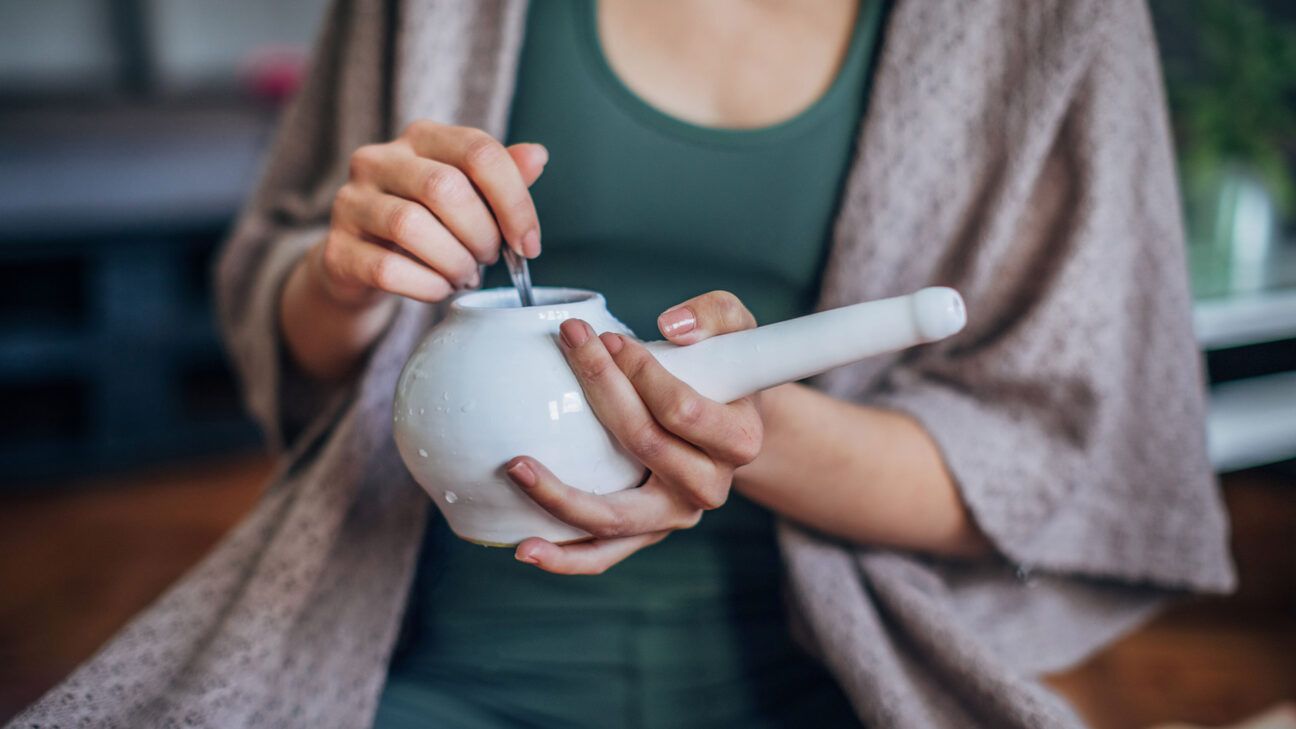
- New research from the Centers for Disease Control (CDC) has found that using a neti pot in combination with tap water increases your risk of a rare but serious infection.
- These infections stem from a type of organism known as acanthamoeba.
- Experts say people using a nasal rinse should be sure the water they use is sterile.
A new study published by researchers from the Centers for Disease Control (CDC) this week has found that using tap water to perform a nasal rinse increases the risk of contracting a rare but serious set of infections.
In particular, the CDC reports that a type of amoeba known as acanthamoeba, can cause a range of symptoms and has a fatality rate of 82%. This infection is rare and is thought to only involve 3-12 people in the US each year.
The study included data from 10 patients, all of whom were immunocompromised, who used nasal rinse and developed the infection.
Dr. Julia Haston, a medical epidemiologist at the CDC who was part of the team behind the study, says that this research is important because in the past it has been difficult to trace the cause of the disease due to the rarity of the illness.
“This is really the first time we’ve ever been able to identify a possible route of exposure for these acanthamoeba infections because this amoeba lives in the environment, and we’re all exposed to it,” Haston said. “Often, it’s really hard to know how these infections happen and if it’s hard to know how the infections happen, then it’s hard to know how to prevent them.”
Acanthamoeba are different from the better-known amoeba called Naegleria fowleri, which is commonly labeled as the “brain-eating amoeba.”
But both of these amoeba and other types of infection can be traced to nasal rinsing without sterile water. These types of infections are rare, but when they happen they primarily damage the brain and the central nervous system.
Dr. Brian Labus, PhD, MPH, an infectious disease epidemiologist and assistant professor at the University of Nevada-Las Vegas, says that the key takeaway is that it is vital to use sterile water when nasal rinsing.
“It’s a very simple message: If you’re going to use a neti pot for nasal irrigation, don’t use tap water, use distilled water or boiled water. That will reduce your risk of disease,” Labus said.
The CDC says for a safe nasal irrigation or sinus rinse, you’ll need boiled, sterile or distilled water. To sterilize tap water you should boil the water for at least 1 minute and at least 3 minutes if you’re at an elevation of over 1,980 meters. Once the water is cooled you can then safely use that water for nasal irrigation.
Those included in the study had immunocompromising conditions that included HIV and AIDS, chronic kidney disease, cancer, and renal failure. Of the 10 people studied, seven survived, which the research team suspected was because they were dealing with an underlying sinus infection that pushed them to seek treatment.
But Dr. William Schaffner, an infectious disease specialist at Vanderbilt University Medical Center, says that it’s not just immunocompromised individuals with these types of conditions who should be changing their habits when it comes to nasal rinsing.
“There may be, actually, some lessons here also for people who are not immune compromised. If you’re doing this not just once or twice while you’re in the shower, when you have a cold, but in a sustained fashion because you think it provides some health benefits, please be sure to use sterile water,” Schaffner said.
One concern public health officials have is that nearly two-thirds of Americans believe that tap water is safe for nasal rinsing. Labus says this is a misconception that needs to be corrected when it comes to an “opportunistic pathogen” like acanthamoeba.
“It’s not that our tap water is unsafe in any way, but it’s not sterile,” Labus explained. “It’s the kind of thing that you don’t want to use in, say, a medical situation. We don’t use tap water if we’re doing surgery, we use water that’s been sterilized, so we don’t introduce bacteria or other pathogens into a wound. It’s the same sort of issue here.”
Preventing an infection with acanthamoeba is critical as there are currently no approved treatments for the infection.
As for acanthamoeba treatment, there is currently no medication that is approved by the FDA specifically for the cure of this infection. However, those who are treated receive a regimen that includes antimicrobial, anti-fungal, and antibiotic medications.
Haston urges those who may have an adverse reaction after conducting a nasal rinse to seek medical care as soon as possible.
“If you perform nasal rinsing, and you ever develop signs of illness, such as headaches, fever, confusion, or seizures, it’s really important to seek care immediately,” Haston said. “And then talk to your healthcare provider about acanthamoeba, especially if you have a weakened immune system.”
The CDC is warning people to use distilled or previously boiled water if undergoing nasal irrigation after multiple people developed a potentially fatal infection with a type of amoeba.
Experts say most people may not realize that tap water is not safe to use in nasal irrigation out of the tap.

